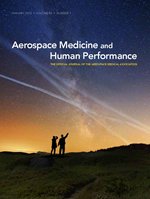 In case any pilots out there are worrying about their risk of prostate cancer based on a recent meta-analysis that found they are at least twice as likely to develop the disease, they should relax — the paper has been retracted.
In case any pilots out there are worrying about their risk of prostate cancer based on a recent meta-analysis that found they are at least twice as likely to develop the disease, they should relax — the paper has been retracted.
The reason: “including inappropriate data from two studies that should be ineligible.”
“The risk of prostate cancer in pilots: a meta-analysis” reviewed eight studies to determine whether airline pilots, who are regularly exposed to radiation and other occupational hazards, have a higher incidence of prostate cancer. However, it also included studies that reported on prostate cancer among all U.S. Armed Forces servicemen, not pilots.
The retraction notice was posted in May — only months after it was published in Aerospace Medicine and Human Performance in February. The notice included a letter to the editor outlining flaws in the meta-analysis and an apologetic response from first author, David Raslau at the Mayo Clinic.
Here’s the notice (appearing at the bottom of page 2):
The authors have requested that the above-mentioned article be retracted. The analysis is seriously flawed by virtue of including inappropriate data from two studies that should be ineligible, as they do not report the incidence of prostate cancer in aviators. Additionally, other data included in the meta-analysis has been duplicated. We apologize for this error.
Questions about the analysis were raised in a letter written by Desmond Connolly, a researcher at British defense company Qinetiq. The removal of the ineligible studies, he says:
…results in a slight but statistically nonsignificant increase in relative risk in pilots. …On this basis, we should have less than 90% confidence that some pilots might possibly have a ~ 25% increased risk of developing prostate cancer compared to the general population.
Connolly points out the need for caution when reporting “dramatic” results:
The power of meta-analysis obliges the utmost care when selecting input data and circumspection when reporting dramatic outcomes. Publication of Raslau et al. misrepresents the evidence and risks masking the truth, whether that is no real increase in risk of prostate cancer in men who fly for a living, or a genuine but less dramatic increase in risk that remains to be validated. As it stands, Raslau et al. may lead many male aviators wrongly to believe that they are twice as likely to suffer prostate cancer as their Earth-bound brothers.
In a response published alongside the retraction and Connolly’s letter, Raslau writes:
This mistake was made because of my inexperience with the subject matter. I was at the infancy of my training in Aerospace Medicine and unfortunately had no prior familiarity with these topics. When I began working on this research project, the phrase “Air Force servicemen” seemed equivalent to the term pilots to me. Now after having completed training in this field, I can easily see the folly of this assumption. Sadly, it was not so evident back then.
I have asked for the article to be retracted. I do not want to perpetuate imprecise conclusions based on faulty data. As Dr. Connolly says in his letter, “the utmost care” is needed when performing a meta-analysis. I will take this lesson to heart and will strive to not repeat my mistake in the future.
Hassan Murad, a clinical epidemiologist at the Mayo Clinic and the paper’s last author, said that the authors are working on getting the paper republished.
Our study, which is a review of the literature called meta-analysis (ie, pooling studies together as if they were a single large study), suggested that pilots have increased risk of prostate cancer. The cause is unknown and the article describes some possible explanations. We have identified one error in the analysis (this is why the study was retracted) that we have corrected. We are now in the process of resubmitting the paper so that it is back online.
Frederick Bonato, the journal’s editor-in-chief, declined to add anything:
The letters I think speak for themselves in this case. I have no additional comments.
Like Retraction Watch? Consider supporting our growth. You can also follow us on Twitter, like us on Facebook, add us to your RSS reader, and sign up on our homepage for an email every time there’s a new post. Click here to review our Comments Policy.